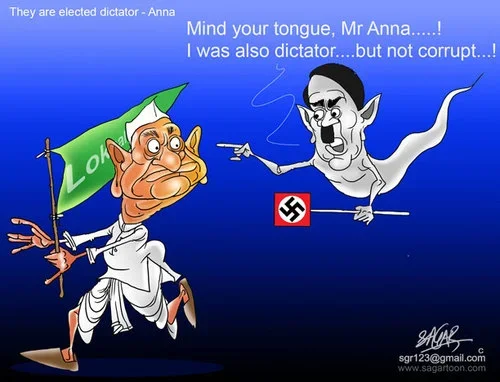Y, K and others,
I hope you know MLK was severely criticized from both sides of the civil rights movement. Those on the right accused him of going too fast, and the ones to his left called him an Uncle Tom. Yet, MLK today is one of the very few brightest of shining stars in the celestial canopy of U.S. politics.
The point is, (i) no contemporary politician stands a chance in a head-to-head comparison with even a half-way decent leader of a previous era, let alone a much revered leader, and (ii) even the much revered leaders from an earlier era were not treated with any awe, contemporaneously. So, if anyone wants to say MLK was a great leader and AH is not, then, my response is -- duh.
History teaches us that it takes a coalition among various segments of the civil society, and the political leadership to get anything done. New Deal was such a partnership, and so was Great Society. These things did not happen, and wouldn't have happened if the civil society did not take an active role in politics and governing. No meaningful change will come without both people in government (MMS) and out of government (AH) working together.
Trying to isolate and delegitimize AH, who has demonstrated large public backing, is not productive.
I have already stated my view on JLP and LP in
post #73. Unfortunately the points I raised have not attracted any meaningful response.
Anyway, IMO, what is important is to compare the provisions of the competing bills. Accusing each other as hellbent or unprofessional, or driven by ego is no good. If that is important to anybody, let me say upfront, I don't want to defend AH the person -- if AH is motivated by ego, fine, if he is a publicity hound, fine, if he is naive and being used by politicians with greater Machiavellian designs, fine too -- I have no defense to offer and you may have an ex parte judgment in your favor on all these counts.
Now, with that out of the way, let me present my case.
An ontological classification of corruption is probably too complex to contemplate, even more inscrutable than the "why" question of cosmology. However, to keep it simple, let us classify corruption into two categories, (i) petty and (ii) major.
Petty corruption is ubiquitous and frustrating. But I think if pressed even the most ardent enemy of corruption can make a case in favor of it. In many ways petty corruption keeps the system functioning.
Also, the cost to the treasury from petty-corruption is miniscule in comparison. To the public, ironically, the cost may very well be negative -- get rid of this corruption and we may very well have to pay more and get less reliable service.
So, and I think most will agree, the second kind of corruption is the cancer that needs to be curtailed, if not eliminated.
Then, JLP or LP, it must take on the second category of corruption and fight it and make it retreat, at least a little. If we can't stand for this, or at least offer our symbolic support, we have no moral authority to demand the lowly autorickshaw driver to be honest.
We can't solve the corruption problem by going after EB clerks and railways TTR, we need to reign in the cabinet ministers and MNCs.
With this preamble, let us take a look at the conflicting proposals of JLP and LP. Let each member decide where he/she stands on these provisions.
Cognition of complaints:
- LP can only investigate complaints forwarded by LS and RS -- i.e. mired in politcs of the hour
- JLP can initiate action suo motto
suo mutto or Nancy Mottu, makes no difference to petty corruption. It makes a world of difference for the likes of Ambani, Telenor, Etisalat. With JP, the corrupt politicians and billionaire businessmen can prevent any meaningful investigation from even getting started.
Prosecution
- The mandate of LP is to produce a report and forward it to the two houses.
- JLP will have the power to prosecute.
JLP will be shielded from corrupt politicians and business interests, but LP will suite the politicians and MNCs very well.
Whistle-blowerprotection
- LP does not offer any protection
- JLP does
Scope to include PM etc.
- JPL can investigate PM, Judiciary and MPs with 7 members approving such investigation.
- Outside the scope of LP
This is definitely a controversial point. Since a high bar is established for taking up complaints against high officials, I am happy with it. But I do understand the arguments against this provision. On balance, I wouldn't mind dropping this provision if an otherwise strong JLP is approved.
In conclusion, I would like a discussion of these points. If your argument is only that AH is a publicity hound, he is blackmailing, etc., please save yourself some time, you can have those points without any contest from me.
Cheers!


